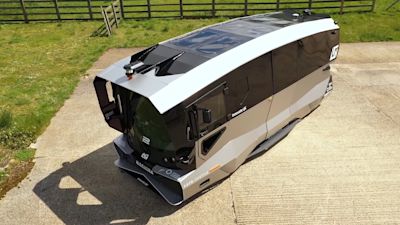Cambridge examination: Autonomous vehicles undergo trial around university campus

The UK's first driverless shuttles have taken to the road in Cambridge, carrying their first passengers in a trial alongside normal traffic.
The autonomous vehicle took a 20-minute journey around the University of Cambridge's West Cambridge campus in a test project which aims to assess whether the technology could one day join the UK's public transport network.
The 10-seater shuttles, created by Coventry-based engineering firm Aurrigo, are designed to run at a maximum of 20mph and are fully electric, with a range of 100 miles.
Safety operators were on board during the tests and able to regain manual control of the vehicles at any time if required.
Greater Cambridge Partnership (GCP), Smart Cambridge and Aurrigo worked on the project, which is supported by the Government's Innovate UK and the Centre for Connected and Autonomous Vehicles (CCAV).
Transport Minister Rachel Maclean was one of the passengers on board the shuttle and said the project is "hugely exciting".
The project was first launched in 2018 and further passenger trials are planned for June.
David Keene, chief executive officer of Aurrigo, described the trial as a major mileston, he said:
Mayor of Greater Cambridgeshire Dr Nik Johnson said: "It is very exciting to see these vehicles working on real roads here as another first in Cambridge.
"These shuttles can be used on demand all day and night, every day of the year - which is unaffordable with our existing public transport."
The region has, of course, played a major role in developing driverless vehicles.
One of the first driverless pods was unveiled in Milton Keynes in 2015. The became the first to start trials of the vehicles a year later.
Bedfordshire's Millbrook - which tests new cars and innovative automotive technology - invested in a purpose built centre to support the autonomous vehicle industry.
It's hoped that driverless cars could eventually cut congestion and pollution. Research by Cambridge University found a fleet of driverless cars working together to keep traffic moving smoothly can improve overall vehicle flow by at least 35%.